Meet Eli. He is the high priest at Shiloh. Once he was charismatic and energetic. He ran a big temple that everybody worshipped at. Women wanted to bring him sacrifices; men wanted to be him. But that Eli is long gone.
Each morning, in the temple at Shiloh, an aide helps Eli into his chair. At night they carry him back to bed. His vision was the first to go. Then went everything else, and now he hardly moves on his own. He is ancient, blind, impassive. But even as he does nothing at all, he does it as high priest.
Meet Hophni and Pinchas. They are Eli’s sons. They suck. They steal sacrificial meat and schtup the worshippers. Daddy ignored their behavior for years. They have now entered middle-age.
Time was that Eli hoped his sons could take over his title. But then there was a problematic prophecy, delivered by the ambitious Samuel when he was just a boy.
Meet God. He created dogs, candy, and cancer. He expects better from humans. He sent Eli a message through Samuel, His new favorite prophet.
That message? It went like this: I HATE ELI, AND I ESPECIALLY HATE HIS KIDS. THIS IS GOD BY THE WAY, JUST MAKING SURE YOU KNOW THAT. TELL ELI I’M GOING TO KILL HIM AND HIS SONS, LOL JK NO BUT REALLY, THEY’RE DEAD MEAT, thus quoteth Samuel, thus sayeth the Lord.
What do you say to that as high priest? As a father?
These days he doesn’t see the boys, and they don’t see him. They have new responsibilities as a result of Eli’s decline. He wonders if that might spur some much-needed personal growth. Maybe his sons are saving themselves. Or maybe it’s too late. But maybe it’s not.
At Shiloh, in any event, Eli sits and waits. It’s God’s move.
As Eli sits, Israel’s military people have come up with a fun idea. That idea is, what if we kicked the goddamn Philistines in the face?
So, they attack. This turns out to be a big mistake. The battle’s timing and precise location was chosen by Israel; they were nevertheless slaughtered. Four thousand fathers, husbands, brothers, sons were lost at Eben-Ezer. The survivors fled. And now, a handful of soldiers, licking their wounds, climb towards Shiloh to propose a shift in tactics.
The soldiers march up to the temple and rattle the gates. They enter the outer courtyard, where a priest is holding down a sheep brought in by a guy who hast doth lain with his step-sister. This is a grievous sin in the eyes of God and also the step-mother. The priest’s knife is raised when the soldiers interrupt.
“It’s urgent,” say the soldiers. “Bring us to whoever runs this place.”
“Baaaa,” says the sheep.
“You sure that’s what you want?”
“It’s a matter of life and death.”
“Well then,” says the priest, putting down the knife.
“Baa,” says the sheep, relieved.
The priest brings them to the quarters of Hophni and Pinchas, Eli’s sons. “Just a moment,” he tells the men, and loudly knocks the door. There is no response, so he knocks again.
“Unavailable,” comes a voice.
“Oh yeah, rub my tummy. I’m just a sad little boy,” says another.
“Soldiers returning from Eben-Ezer request an audience,” shouts the priest. “They say it’s urgent.” He gives the warriors a thumbs-up.
There is an audible bustle in the room—hushed conversation, scurrying feet. The door opens and out comes a young woman, smoothing her white smock as she hurries past. Two priests appear behind her.
“That was a very good sacrifice lesson,” says Hophni, the taller of the two. “And don’t forget to do your homework, for the lesson. Which is what we were doing in here. Practicing for the sacrifice test. Come back next week. So we can do it again.”
Pinchas blows her a kiss. Hophni elbows his brother and whispers, gesturing towards the soldiers.
“I present, the people who run this place,” the priest says, and quickly leaves our scene.
• • •
The brothers offer the soldiers some goat, freshly plucked from a leper’s burnt offering. It’s totally kosher, Hophni assures them, the leper hardly touched it. The soldiers decline. Pinchas nods and shoves a forkful of goat in his mouth.
“We didn’t have a chance,” explains a major. “We planned to surprise them, and we did. It didn’t matter. Their swords snapped our spears. They moved with brilliant discipline and logic we couldn’t anticipate. Now what? The nation is grieving. Perhaps Israel will never recover.”
“Which is why we respond now!” says one of the men, slamming the table with a fist.
“Mmhmm,” said Hophni, wiping goat off his chin.
“Let’s not be rash,” says the major. “How much more blood can this nation shed?”
“We have an advantage though,” the man excitedly pushes back his chair. “We all know the stories of Joshua and the holy ark. What enemy can stand when the Lord enters the battle? The Philistines are heathen scum—they will melt in His presence! And our people will rise, as one people, with one God, and we will regain what we lost, with an army standing behind the Ark of the Covenant!”
The major allows his soldier to make the case. This is why they came, to ask for the ark. They wait for a response.
“Here’s the thing,” says Hophni, still chewing. “You can’t take this sort of thing lightly. The ark is our holiest vessel, a conduit for the Lord’s presence. Only priests can carry it from the Holy of Holies—that’s a whole thing. Then priests have to carry it into battle. This is all serious business, and a big ask, in terms of priestly work-hours.”
“Maybe a sacrifice would help?” the general suggests. “Possibly a humongous goat.”
“You’ve got yourself a goddamn deal!” Hophni claps the general on the shoulder. “My brother and I would be pleased as punch to bring the ark. Give us a minute or two to clean up from the, uhh, sacrifice lesson. Yeah, we have to just change our sheets. And clothes. And curtains. From the sacrifice lesson.”
A perfect plan—what could go wrong?
At Eben-Ezer, a Philistine lookout hears commotion off in the distance. The young man is part of the advance guard, stationed at the outskirts of the Philistine encampment. The lookout rushes to the top of a nearby hill, sword at his side.
What he sees is a column of Israeli soldiers moving directly towards him.
The soldier dashes to his superiors, who join him on the hill. He points to the Israelites, who are blowing shofars and chanting in Hebrew. Two men, dressed entirely in white, can be seen walking in front. One is taller than the other. They carry between them a gleaming golden box with two mysterious winged creatures on top.
A wave of panic runs through the Philistine camp. The Ark of the Covenant is coming.
Superiors call an emergency meeting. There is disagreement—to fight? To pray to their mightiest gods, to Dagon? What do the priests say? And still they hear the shofars growing nearer, the chanting ever louder.
The lookout stands on his hill. The Israelites are now just minutes away from his position. Still he has been given no orders.
With horror, he watches as the priests and the ark approach his lookout hill. They chant their horrible Hebrew words while the priests invoke mysterious, powerful names of God. The Ark of the Covenant is mesmerizing, with a brilliant golden aura, now close enough that he can see the quiet expressions on the cherubs that cover it.
The Israelites reach his hill. They climb it. Now they stand directly in front of him: the two priests, dressed from head to toe in white linen.
The Philistine stands before the ark. The Israelites, with brothers in front, stand before the Philistine. The tall one says something in his confusing Israelite language, something the lookout only half understands.
“Maybe should be moving so kill you people a bit with our God? In now, OK? Also by way, we take your womans for pleasing?”
There is a moment, a pause. A bird squawks. An Israelite cleans his shofar. The short brother scratches himself.
Not sure what else to do, the Philistine draws his sword. He points it at the tall priest, who smiles at the lookout.
The lookout inserts the sword into the tall priest’s neck. Blood gushes out.
The Philistine removes his sword from the tall priest. He puts his sword in the short priest’s chest. Blood, guts, etc.
Both priests fall. They are, obviously, super-duper dead. The ark slumps to the ground. Behind them, Israelite soldiers panic. They retreat, dropping shofars left and right as they run.
And when all is said and done, the Philistines discover—to their surprise and horror—that not only have they routed the Israelite army, but also they come into possession of the mysterious, powerful, legendary Ark of the Covenant. And nobody is quite sure what to do with it.
As soon as word of the disaster arrives, a messenger is assigned to speak with Eli.
The messenger finds Eli alone in his room, in his chair. The high priest is silent, but turns to the messenger’s footsteps and is attentive when the man clears his throat. No way to sugarcoat it.
“I’m sorry to be the one to tell you,” says the messenger. “Your sons have died.”
Eli shakes his head but does not speak. He nods towards the messenger, who continues on, though Eli’s attention has drifted away, thinking of something more pleasant. He’s imagining a warmer, kinder universe, one where the children are all saintly and the gods never get upset.
“…and that’s what happened to the ark,” says the messenger.
Wait. What. Huh. Hold up.
“Did you say, ark?” Eli says.
“Uhh, right. The ark, sadly, was lost in the battle. The Philistines have it, the military men are weighing our options.”
The words hit Eli’s passivity like a bolt. The ark, lost? Impossible. Something that essential is never truly gone—there are ways of finding the ark, of bringing it back home. The ark is their connection to heaven, the only thing that keeps God tethered to Shiloh. It cannot be lost.
There is much to do, and it must be done at once. Sacrifices to be brought, plans to be made, arks to recover. Eli can sit no longer. He rises from his chair, ready at last to act…
But his body, unused to action, flops on the way out the chair. Whoops. He falls onto the floor and snaps his neck. If only he had stood up more often. EXIT ELI.
Meanwhile, thousands Israelites had been killed along with Hophni and Pinchas while fleeing the Philistine attack.
And when Pinchas’ pregnant wife heard about her husband—and about Eli and the ark—she went into labor.
She died too.
But her son lived. They named him Ichabod, which in Hebrew means “we lost it all.” Ichabod grew up to be a basically decent human being. There’s your happy ending.
But behind enemy lines, in the Philistine city of Ashdod sits the Ark of the Covenant. The Philistines fear it, poke it with sticks, try to figure out what you do after you capture the living, beating soul of an Israelite god. And on top of the ark sit the cherubs like two lost boys who have gotten themselves into a heap of trouble.
• • •
Join us next time for…Whoops, Probably Shouldn’t Have Taken That Ark!
OR
Please, Oh Please God, Heal My Butt!
OR
You Made Golden WHATS?
OR
Samuel Shows Up A Lot More

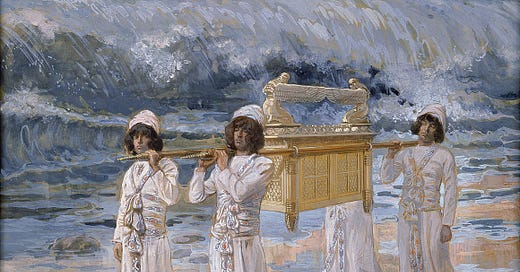


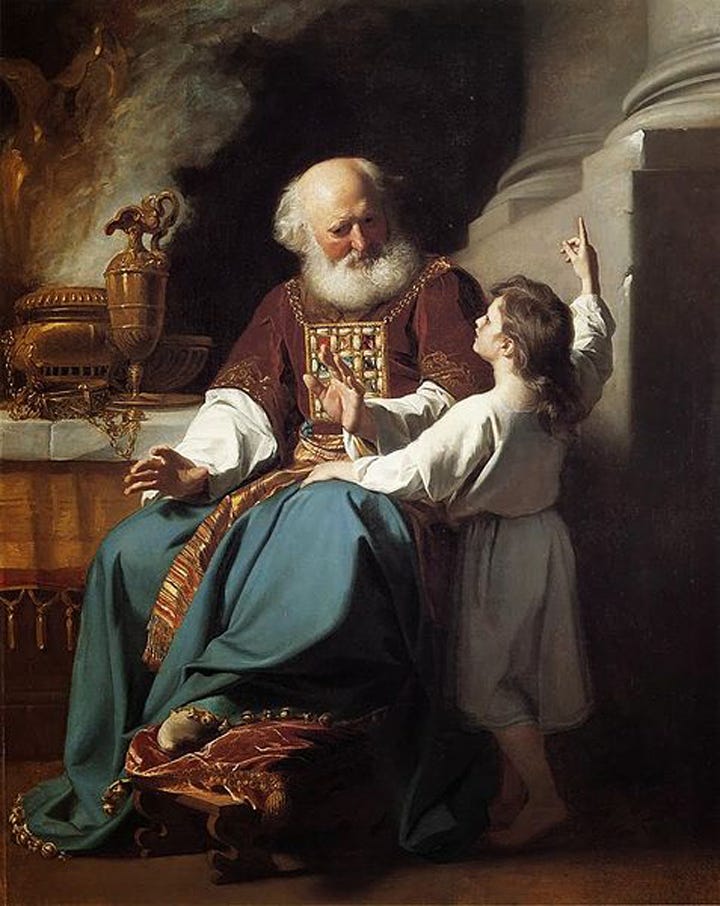
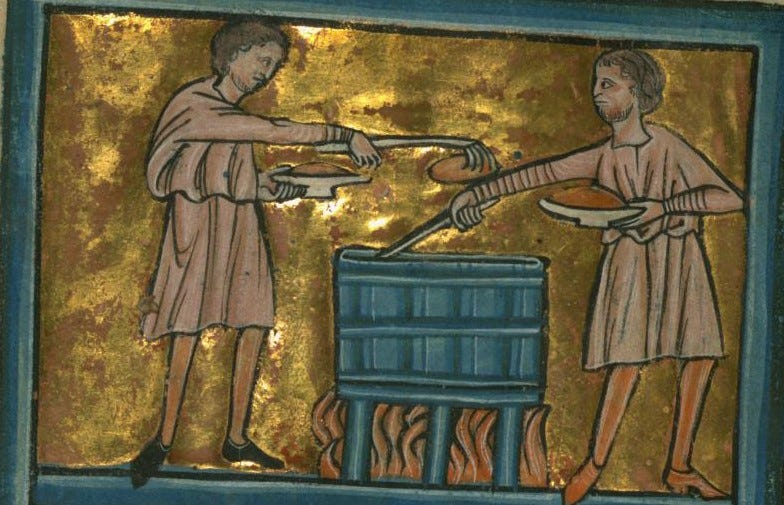
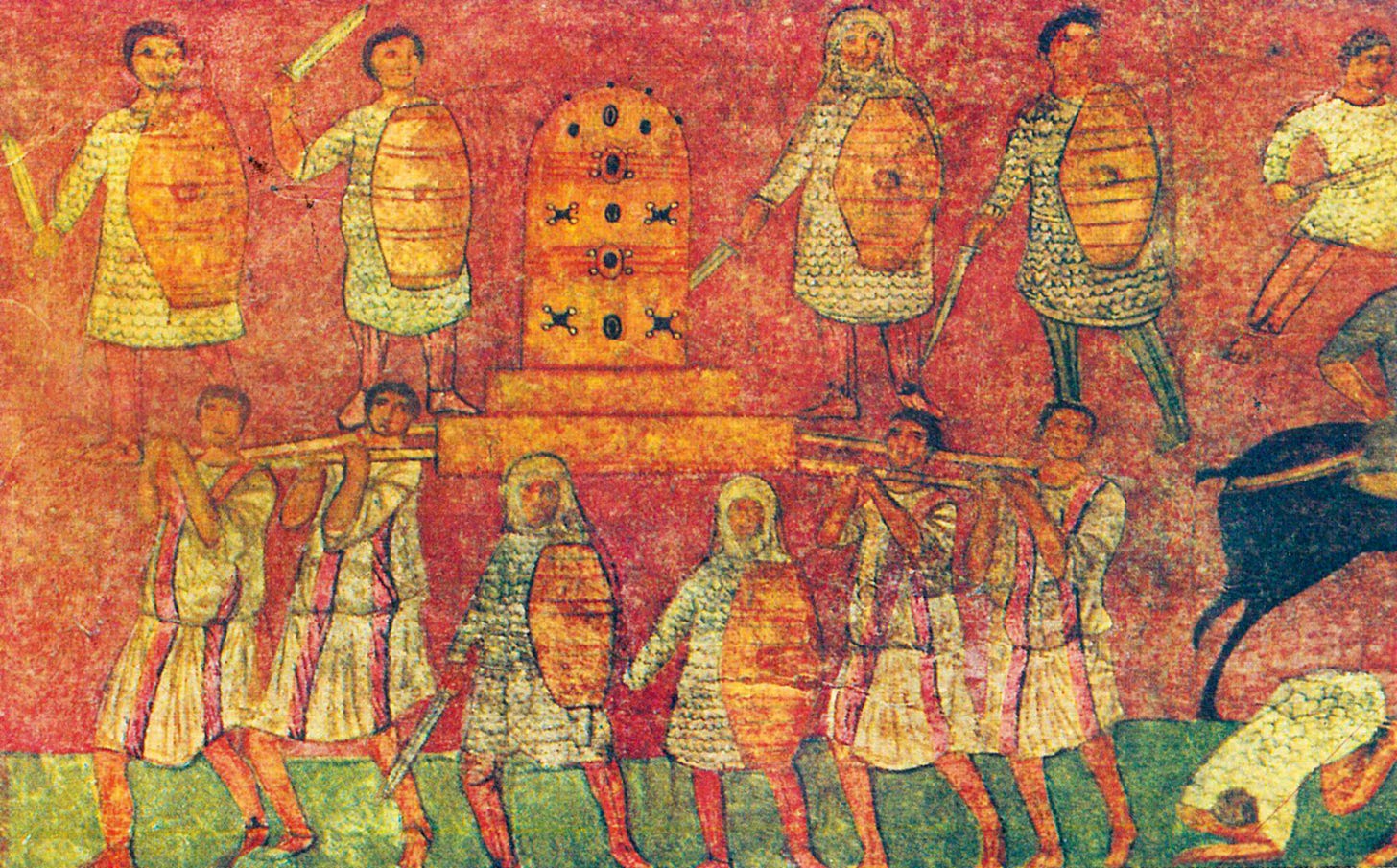

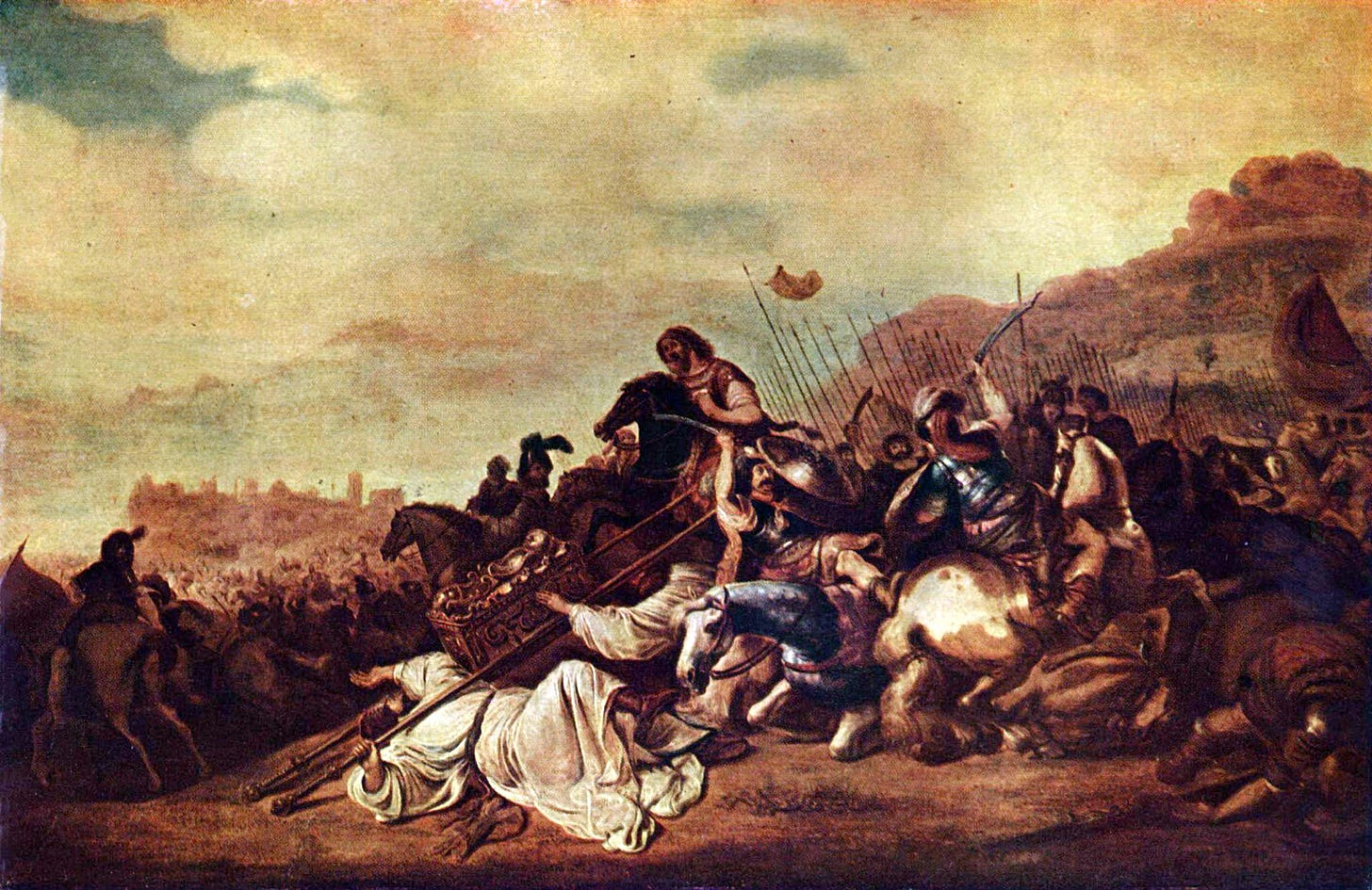

Cliffhanger!
Almost as good as the Robert Alter version!